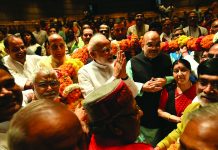
Photo: Getty Images
Abhishek kapoor | 40 Filmmaker
Why did you decide to work on developing a Chetan Bhagat novel into a film, and how did you approach it?
When I read the book, I saw the opportunity to make a very pure Indian film. The book dealt with friendship, love, politics, cricket, religion, the earthquake and the riots; pretty much everything that summed up India from 2000-02. As a filmmaker, I saw the chance to make a film that would reach out to all Indians and also make a mark internationally.
This is your first film with a major studio. How has the experience been different from your previous films?
A studio makes many different kinds of films, so all their eggs are not in one basket. It’s not about their style; the film is not an extension of their own personality. At the same time, studios have a wide reach, and once they decide to make a film, they back it all the way. The backing, the distribution, the exhibition is so big, that you can be certain the film’s potential will be maximised.
What was it like to premiere as the first Indian film to be featured in the World Panorama section of the Berlinale?
Fabulous. What a platform! The world’s best filmmakers are out there, and to premiere in front of a crowd of 1,500 and get a standing ovation at the end of it! None of them can speak Hindi. Most of them can’t even speak English, because they’re European. To just see them come together and respond in the same way was exhilarating.
Your life has been spent in big cities. How difficult was it to relate to small-town sensibilities?
It’s like making a film in a different country altogether. You have to unlearn so many things to understand the culture of the place, the society they come from, the aspirations they have, the frustrations they have. When you get into a new project, into alien territory, you’ve got to go in there with humility and the desire to learn and appreciate. Every director would have his own perspective, his own insight into a new space, and I had my own. You’ve got to find your way through it and look for your story, your characters. You have to encourage your team to fight it out and give it their best.
The newcomers in the film have been praised for their acting. How important was the lack of established stars for you, to make the film you wanted to make?
Established stars are not what makes a movie, good actors are. Established stars get you an opening. The story demanded freshness and innocence, and you needed the three of them to be friends. If I cast one star in it, there would be an imbalance in their friendship, and that was not acceptable to me. Everybody had to look like equals, they had to give their best, and, more than anything else, convince the audience that they exist. That these three boys are somewhere out there in Gujarat. That could only happen with these three youngsters. After Rock On!! did so well, the instinctive reaction was to work with stars. But I realised early on that this was not the correct move, and it was not materialising for some reason. When I found these three boys, there was no looking back.
Making a film even partly about the 2002 riots is fraught with peril. How did you go about it, and have you had any trouble getting your film released?
The riots and the earthquake had tragic effects on the people of India, especially in Gujarat. We were aware of it. But at the same time, the film is not about the riots. It’s about the three boys. Whatever is happening in the backdrop has to be seen through their eyes. We touched upon them in the right measure. More than anything else, you don’t want to go out there and titillate the audience, start scratching raw wounds. You want to be very sensitive to the people and what they’ve been through. It’s more about healing than investigating.
You’ve steered clear of the politics of the riots, framing the protagonists’s involvement in purely personal terms. Do you not feel, as an artist, a responsibility to society, to provide some perspective about a tumultuous event in our history?
It was a conscious decision. The moment you get into the riots, you lose the innocence of the boys. The focus shifts away from the central theme of friendship. As a filmmaker, my priority is my story and script, not making a social point. You don’t want it to trip you up.
Do you see a shift in mainstream Indian cinema away from the formulaic?
I believe there are far greater opportunities in India today to make ambitious films than earlier, but most filmmakers are not using them. They are wedded to the lure of the 100 crore club, and that means they play it safe. They take it for granted that this is what the audience wants. For the audience, Bollywood is the primary source of entertainment. They don’t have much choice. A film with a major star will make money, regardless of how bad it is, because people pay to watch the star, not the film. But if you came together and decided you would only support good films, and put in the effort, you could end up making 300 crore, as 3 Idiots did.
ajachi@tehelka.com













